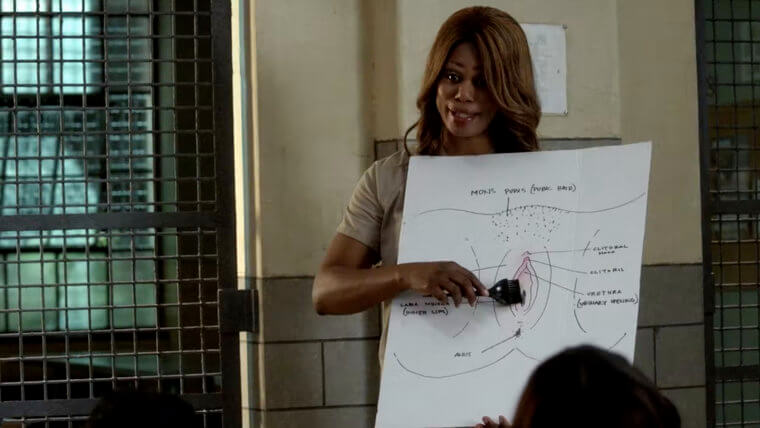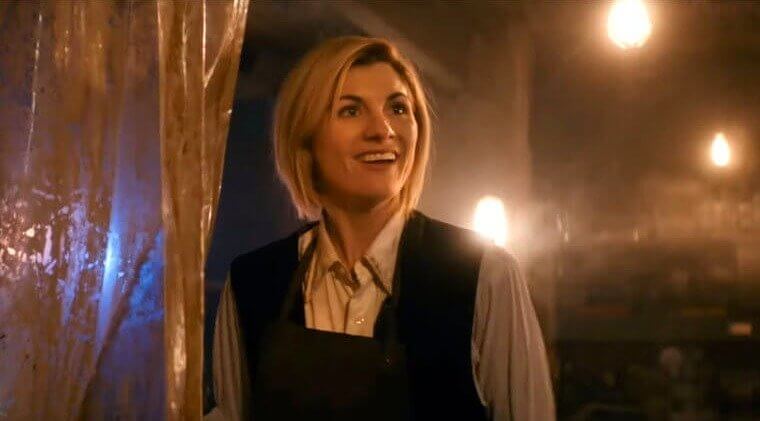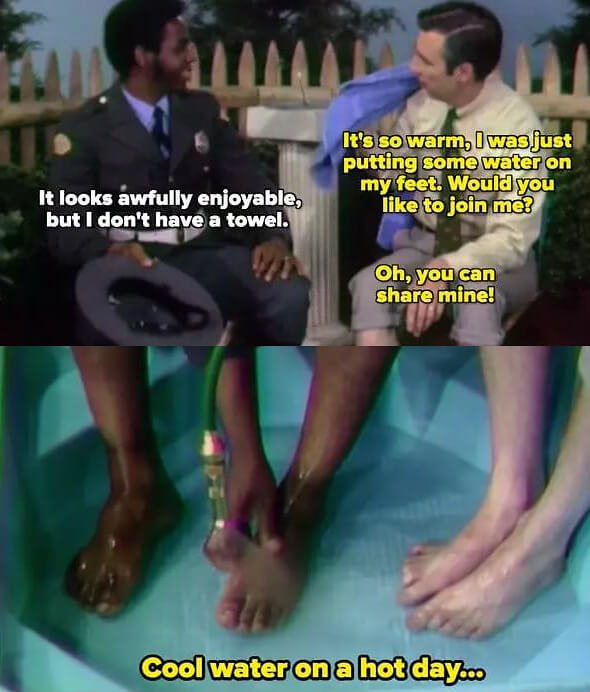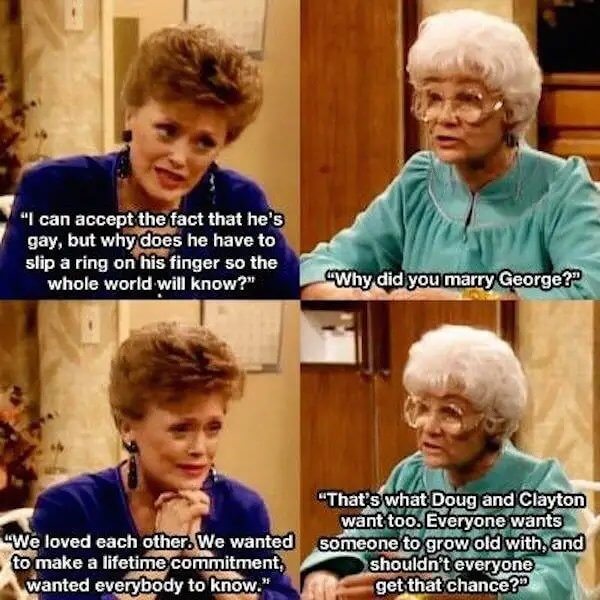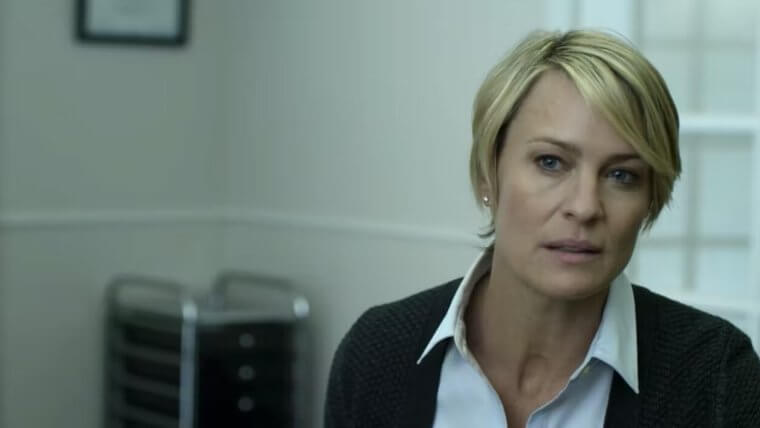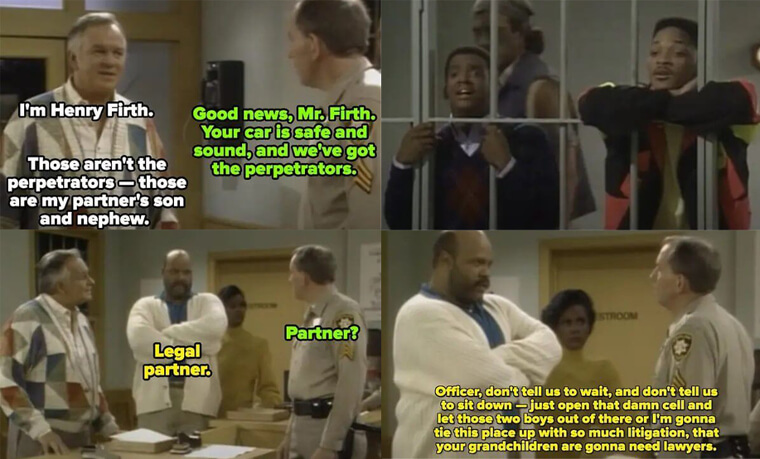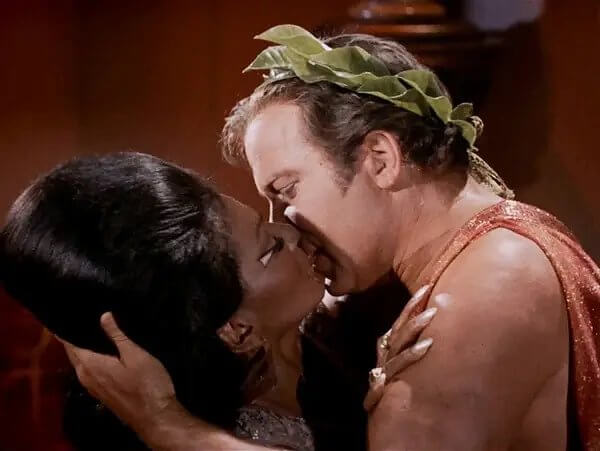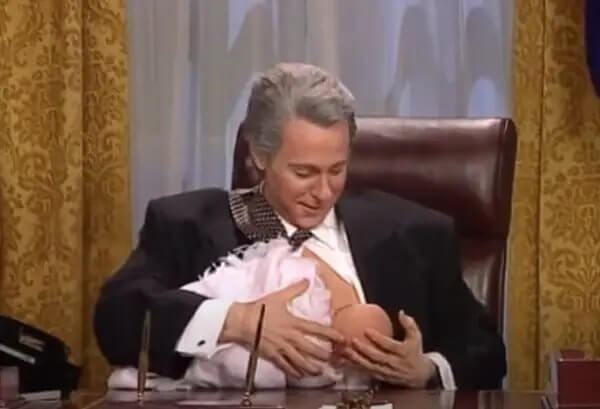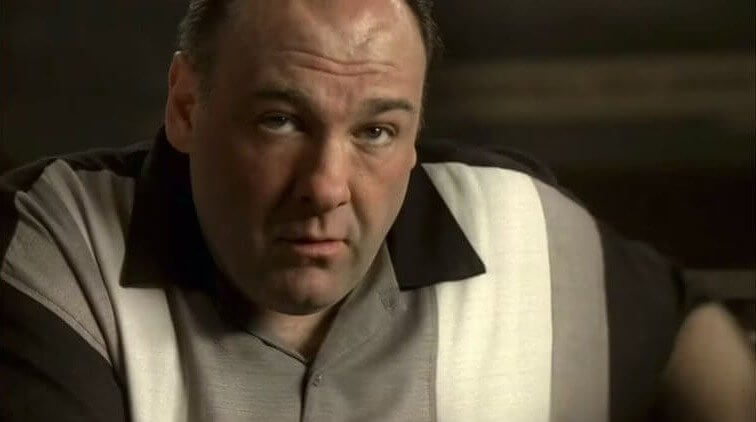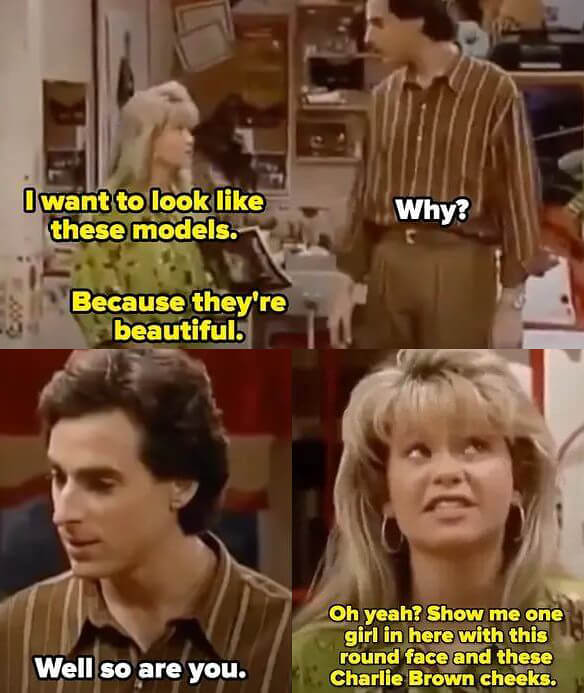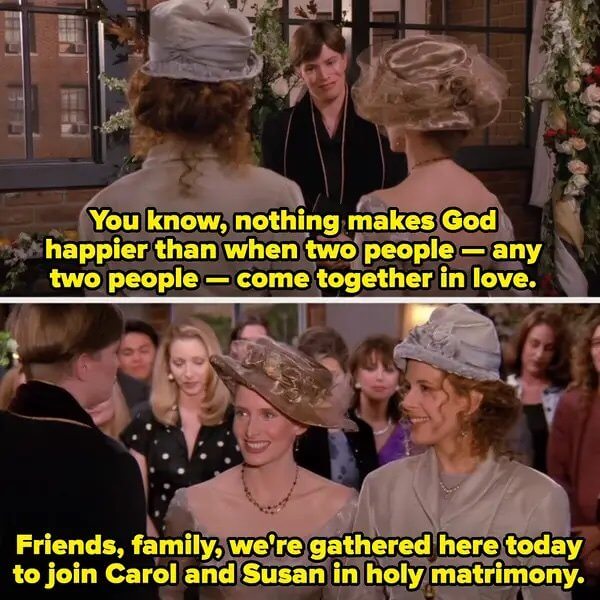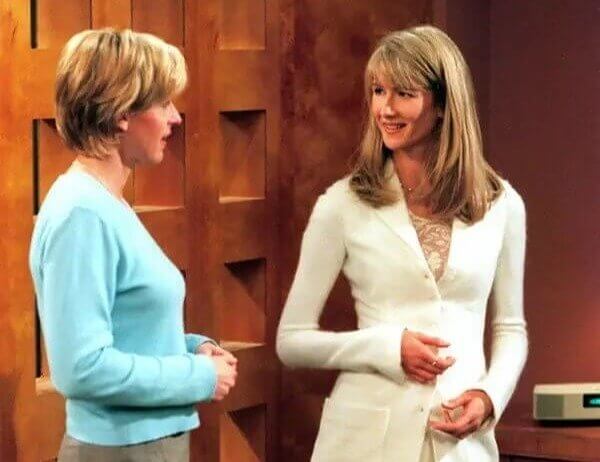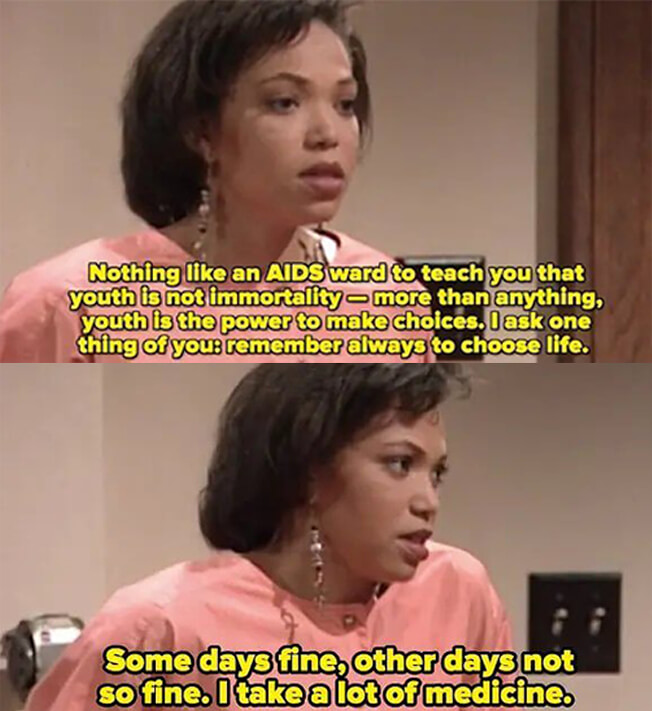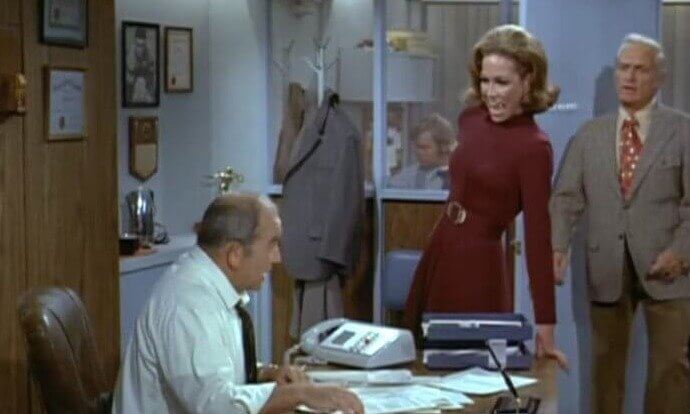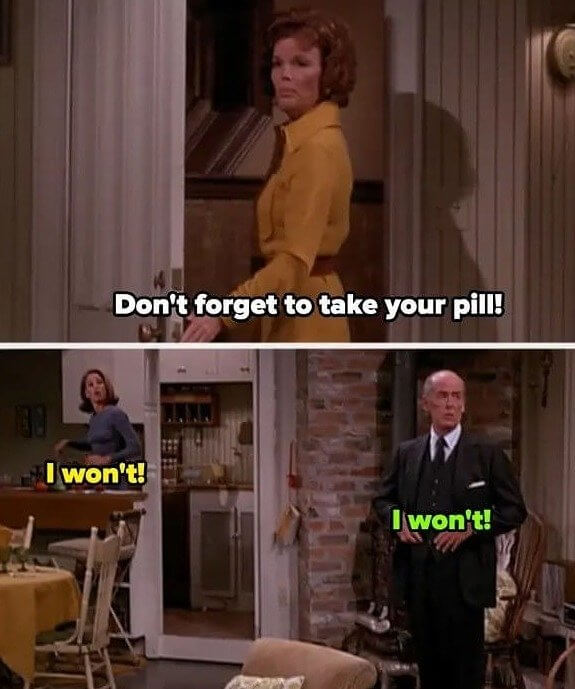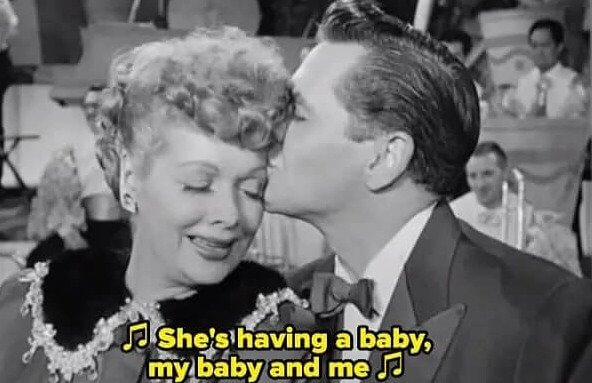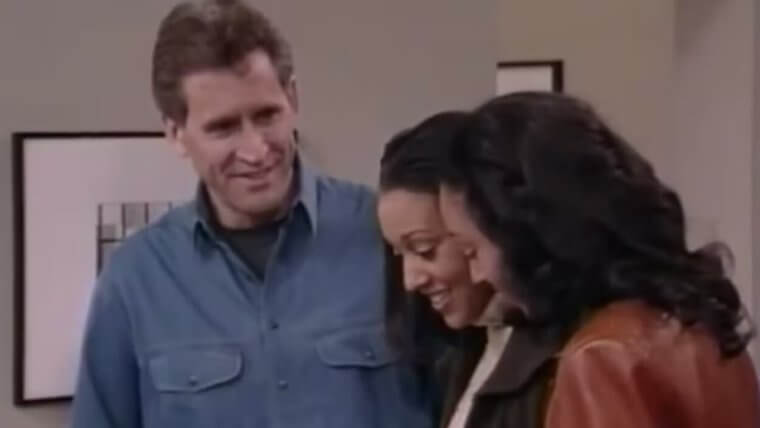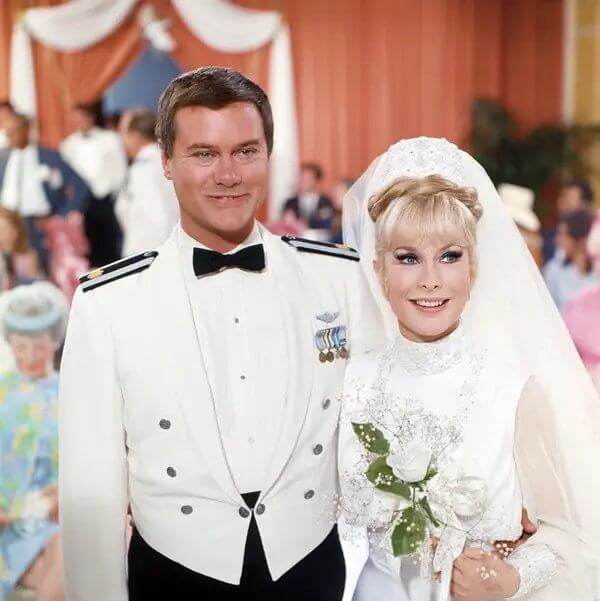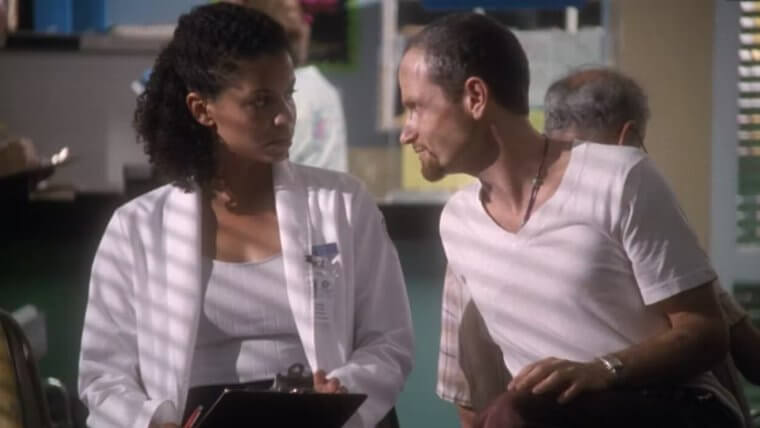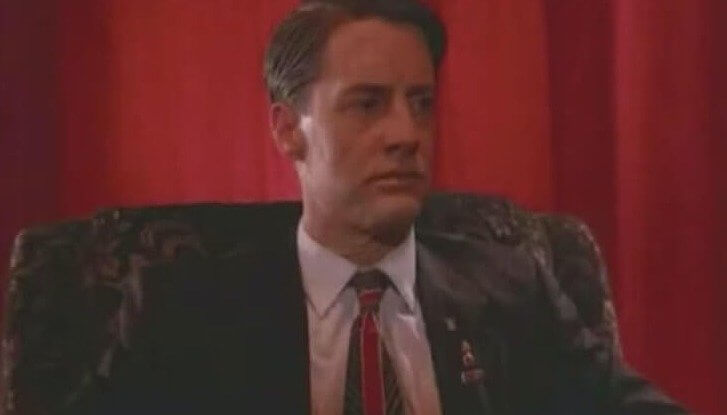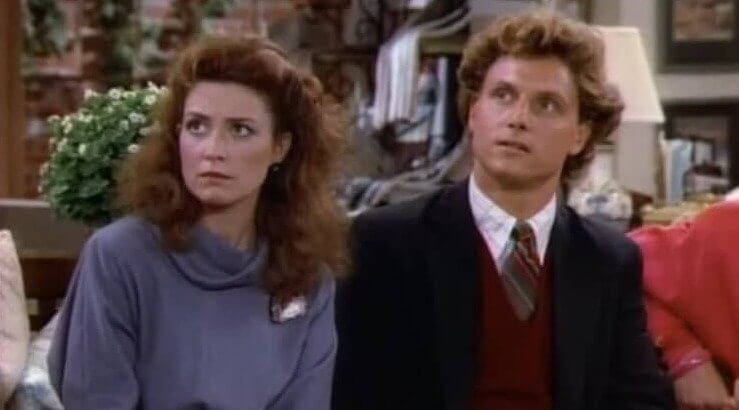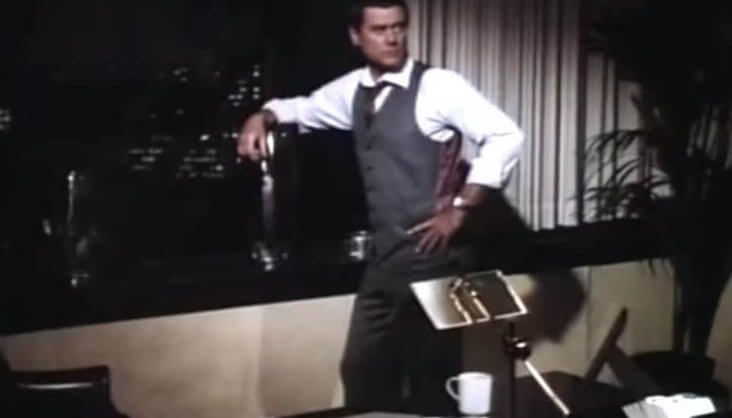Orange Is The New Black Teaches Anatomy Better Than Health Class
Orange Is The New Black was a groundbreaker for more reasons than one. The way it dealt with LGBT+ relationships, incarceration, and prison stereotypes were all completely unexpected and probably why audiences fell in love with the show so quickly. The show's creators also weren't afraid to push the boundaries even further, and in this episode from 2014, Sophia (played by Laverne Cox) does exactly that. It's still illegal to show women naked on tv, but that didn't stop Sophia from teaching her fellow inmates a little (scratch that - a lot) about female anatomy.
The bluntness and directness of the show in discussing this part of the human body were groundbreaking. And for some of us, it taught us more than health class ever did!
Courtney Cox's Tampax Commercial Minced No Words
While this wasn't necessarily a moment that happened in a specific TV show, it was a massive scripted TV moment, so it deserves a spot on this list. Courtney Cox, who played Monica on the popular sitcom Friends, was a part of a Tampax commercial in the mid-80s that featured the word "period." It might sound crazy reading this, but that was the first time "period" had ever been said in that context on national television.
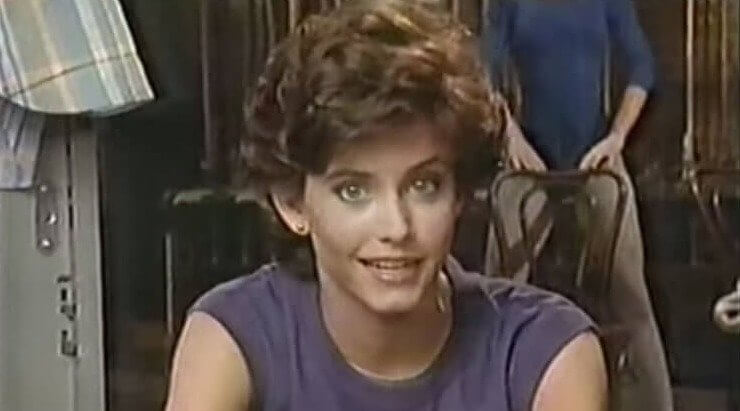
It's less prevalent today, but broadcast networks still seem incredibly wary to really discuss women's issues the same way they do for men.
Dawson's Creek Airs First-Ever Romantic Kiss Between Two Men
It wasn't until Y2K had come and gone that people finally seemed ready for a gay kiss between two male characters on a tv show. Alright, alright, so the moment had already passed with a little peck during Will and Grace, but we're talking about a real, romantic, lovers' kiss. Thankfully, the writers on Dawson's Creek decided they were tired of waiting for someone else to do it, and they wrote that scene into one episode in May of 2000.
As we discussed elsewhere, representation in media is incredibly important. It helps people to feel seen and connected to characters in a program while also promoting higher viewer rates.
Maude Talked About Abortion Before Roe V. Wade Was Decided
Maude was a sitcom that ran on CBS for six seasons throughout the 1970s. The show featured Bea Arthur of the Golden Girls playing Maude, and in a scandalous episode at one point during the show's run, she discusses her desire to get an abortion. In the show, she's already in her late-40s, so this created a wider discussion about the accessibility of abortion in the United States, a discussion that usually revolved around young people.
On any network television show, creators are going to be cautioned away from discussing political issues, but that didn't matter to the creators of Maude.
Jodie Whittaker Takes Over As The First Female Doctor Who
Doctor Who first aired on the BBC in 1963. The story is about a fictional, 2,000+-year-old time-traveling doctor who is trying to protect the human race, and over the years, a number of different individuals have been chosen to depict the famous Doctor. However, after more than 50 years and a whole host of doctors, it wasn't until 2017 that we finally got to rejoice at the announcement of a female Doctor Who!
The role was given to Jodie Whittaker, and we loved every minute of her performance as the doctor. But when the news first broke, some fans were more than disappointed.
Mister Rogers Fights Racial Segregation
Mister Rogers' Neighborhood is where all of our friends (ourselves included) practically grew up. That man's kindness and gentle advice helped us all navigate our early years, and a number of his lessons carried over into our adult lives. But, if there's one episode in particular that stands out when we discuss how Mister Rogers helped people be better, it's the episode where Mister Rogers and Officer Clemmons cool off together in the little pool.
This episode aired in the late 1960s, while racial tensions were boiling in the US and Black people were still banned from using most public swimming pools. By sharing a pool with Officer Clemmons, Mister Rogers was both subtly and implicitly saying that it was time for these racist practices to change.
The Golden Girls Said "Love Is Love" Long Before the Law Agreed
In one of many heartfelt conversations between Blanche and Sophia on the Golden Girls, Blanche admits that she's a bit wary about her brother marrying another man. She doesn't mind that he's gay, but she's worried that he'll be discriminated against once people can see that he's openly gay. But, as Sophia helps her to understand, her brother just wants to enjoy the same type of love that heterosexual couples do, and there's nothing wrong with that.
The Golden Girls was groundbreaking for a number of reasons. Something about having older characters teach life lessons really cemented those lessons in the heads of audiences.
The Simpsons Takes a Jab at Gun Issues
In recent years, the rise of mass crimes involving guns in the United States has caused much discussion on weapon control and policy. But long before the public was in constant debate over this, the creators of the Simpsons were already lobbying the American people to look more closely at their gun laws. In this episode, Homer, who has a laundry list of problems, is told he can have three handguns, no questions asked.
Even today, taking such a prominent stand for changing the law is controversial to many, so back in 1997, it was even more jaw-dropping!
And This Was The Day The Binge Watch Was Born
House of Cards was one of Netflix's most successful and suspenseful original series. Plus, before everything happened with Kevin Spacey, the show was widely regarded as one of the most promising around. But, and many people seem to forget this, back when the show was released, streaming still looked a lot different. House of Cards was one of, if not the first, television shows to have an entire season released on a single day, giving people their first experience with real binge-watching.
Since House of Cards came out, it's become common practice for streaming services to drop entire seasons at a time.
The Fresh Prince Faces Racism in the Justice System
The Fresh Prince of Bel-Air changed comedy television as we knew it. The world fell in love with the family and laughed along with all of their adventures. But the show also had its serious moments - like this episode that discussed racial issues in the United States. The episode featured below, where Will and Carlton are arrested, was one of the most groundbreaking episodes of the decade.
In the episode pictured, Uncle Phil faces racism when his position as his white friend's legal partner is called into question - right after Carlton and Will are wrongfully arrested.
Star Trek Airs One of the First Interracial Kisses Ever
The original Star Trek TV show came out a number of years before the movie and continually pushed the boundaries for what is and isn't acceptable to show audiences. In the example featured below, from a 1968 episode called "Plato's Stepchildren," the show's creators even featured an interracial kiss between two leading characters. 1968 was the year that Bobby Kennedy and the Reverend Dr. Martin Luther King Jr. were both assassinated, so this was a pretty big deal.
At a time when the United States was reeling from racial tension and the path forward seemed murky, Star Trek hit the airwaves to tell everyone that we should all be living in harmony, regardless of color or creed (or species).
Murphy Brown Causes an Uproar for Becoming a Single Mom
Murphy Brown ran for over 200 episodes from the late 80s into the early 90s and became such a phenomenon that even the American Vice President was in the news talking about the show. That Vice President was Dan Quayle, who took offense to Brown's having a baby on her own in the program. Apparently, even though Murphy makes it clear that it is her decision to have the child, Quayle thought the show was belittling fathers.
Regardless of what Vice President Quayle says, we think this was an important episode that helped women to see that it's never too late to start a family.
The Controversial Scene That Got the Dana Carvey Show Cancelled
Dana Carvey was America's favorite comedian for a short span of time, and he seemed poised for a breakout career, especially when his sitcom, The Dana Carvey Show, first aired. That's not to say Carvey hasn't exceeded expectations over the years; he's a massive success and noted as one of the best comedians ever. But, his show massively flopped. It seems people just weren't ready to see a breastfeeding President Clinton back in the day.
To be fair, this was the first sketch of Dana's show, so viewers didn't have a lot of time to get comfortable before this was sprung on them. Who knows, though - maybe Dana designed it that way.
When Recess Was Teaching Critical Race Theory
Miss Grotke, the teacher from the Disney show Recess, wasn't the type of teacher you want to mess with. She was always honest, and this episode was no exception. As she's passing out textbooks for the kids, she gives them a disclaimer that they should take everything with a grain of salt, considering all the books were written by old, white men who rarely presented minority stories in their educational materials.
The United States is dealing with this same type of discourse again today, as parents and teachers debate the merit of critical race theory in classrooms. But you can imagine the outrage when this aired decades ago on a children's show.
The Golden Girls: The Original #metoo Pioneers
The Golden Girls tackled a number of issues in their seven-year tenure. One of the most relevant was when Blanche reported a coworker for sexual harassment and then had to deal with being questioned by her boss. As any woman who has been assaulted knows, it can be a nightmare getting people to believe her, and even then, there are these ingrained systems in place that, unfortunately, protect abusers.
As Blanche tells the boss, it doesn't matter that a man's career is on the line. Her career is also on the line, and she was the one who was harassed!
The Sopranos Fades To Black
We didn't want to stop believing in Tony Soprano and the rest of the crew when the Sopranos ended its run in the mid-aughts. But, the show had to come to an end, and we think the creators found a pretty ingenious way to cap things off. As opposed to some blood-bath or cliffhanger to end, as most people expected would happen, the Sopranos ends during a family dinner, with ten seconds of complete pitch black.
We got a new version of this ending earlier this year with the Sopranos Chevy commercial, which featured Don't Stop Believing, and A.J. and Meadow driving around in electric Chevys.
Full House Bashes Unrealistic Beauty Standards
Actors and actresses on television, more times than not, are these Greek gods and goddesses whose stunning good looks make audiences worldwide self-conscious. On Full House, they had an actual Greek god in John Stamos, but they also had Michelle, Stefanie, and DJ, the three daughters that grow up through the course of the show. In one episode, though, DJ acts exactly like we all did when we were teens, showing a level of self-esteem we don't usually see on TV.
When her dad tries to help her feel better, DJ points out how no one in fashion magazines actually looks like her. What's also important about this episode is that we see the physical toll it is taking on DJ as she tries to be perfect.
Seinfeld Openly Talks About Female Contraception
Julia Louis-Dreyfus played the female lead on Seinfeld in the 90s, a character named Elaine Bennis whose sexual exploits make up the plotline for more than just one episode. But, what Seinfeld does better than most other shows is that they show Elaine's struggles, as opposed to sugarcoating what sex is like for women. In this particular episode, Elaine is struggling to find contraceptive sponges and has to decide whether her prospective partners are actually sponge worthy.
It's pretty crazy that this episode aired almost thirty years ago, and female contraception is still incredibly hard to come by.
The Lesbian Wedding On Friends
Friends is one of the most popular sitcoms of all time, and last year's reunion event brought in huge viewership. One of the reasons the show stayed so popular is the fact that they weren't afraid to challenge the norm and put some groundbreaking content on TV. This episode from season two is just one example of that, where two women were joined in marriage on the TV, giving Americans one of their first-ever televised lesbian marriages.
As they say, love is love, and hopefully television shows like this one can help anyone who still doesn't get it to understand.
The Puppy Episode Finally Lets Ellen Be Herself
On Ellen, a popular sitcom in the 90s, Ellen Degeneres plays a single bookstore owner in her thirties. In the early episodes of the show, Ellen dates men. However, after coming out of the closet in real life, in both a Time Magazine interview and a sitdown with Oprah Winfrey, Ellen decided it was time her character reflected more of her true personality. So, in a famous episode called The Puppy Episode, Ellen comes out and admits to having feelings for another female character, played by Laura Dern.
In the years since this episode came out, both Dern and Degeneres have remained staunch advocates for gay rights in the United States.
Ellen And Oprah Sit Down To Discuss Degeneres's Sexuality
In early 1997, popular standup comedian and television star Ellen Degeneres came out of the closet and admitted in a now-famous Time Magazine article, "Yep, I'm Gay!" The headline shocked American audiences, or at least shocked the ones whose gaydar wasn't so strong. But, a few weeks later, Ellen went and sat down with Oprah so people who preferred watching to reading could still hear her story and understand her struggles as a gay woman in show business.
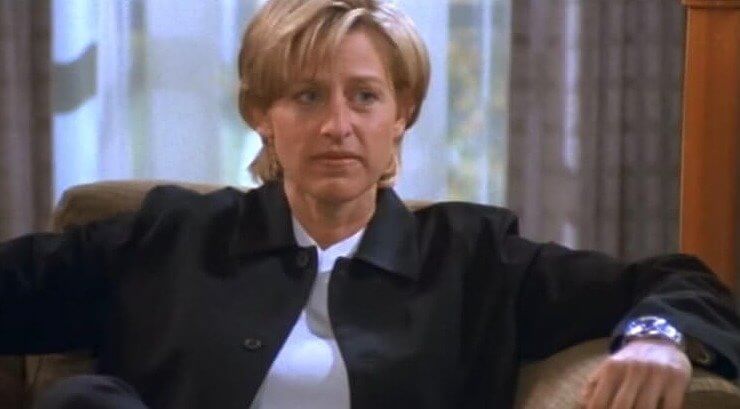
A few months after this, Ellen offered viewers another chance to reckon with her sexuality when her character came out as gay on her sitcom, Ellen.
A Different World Humanizes the AIDS Epidemic
A Different World was a show that ran from the late 80s into the early 90s, presenting the stories of students at Hillman College as they navigated life. But, in one episode during the height of the AIDS pandemic, the show took the opportunity to discuss the medical situation the world was facing with some compassion and tact. One character, Josie, admits to having AIDS, which gives the other characters the opportunity to ask questions about her condition.
One of the mainstay slogans during the AIDS crisis was: "You can't get AIDS from a hug." This episode attempted to create the same kind of reckoning, forcing people to realize that those suffering from HIV are our regular, everyday neighbors and peers, not some abstract group.
Saturday Night Live Had To Ban Costello For This
Elvis Costello is an English artist who earned himself a ten-year ban from Saturday Night Live in late 1977 after he decided to play the one song he'd specifically been asked not to play. Costello's song, "Radio, Radio," takes aim at the recording industry and the way they treat musicians, but it also takes a few potshots at TV broadcasts and complains about the way music is presented live on television.
Costello isn't the only person to earn himself a ban from Saturday Night Live. Rage Against The Machine was also kicked off the show after an incident very similar to Costello's.
Felicity Brings up Assault in Romantic Relationships
Felicity was a short-lived American sitcom in the early late 90s to early aughts that was championed for being more down-to-earth than other sitcoms of the period. Instead of going over the top with conflicts in episodes, Felicity focused on making characters more human so that audiences would have someone to relate to. In doing so, they created opportunities to discuss really important topics, like sexual assault by a partner, which they otherwise would've had no recourse to bring up.
Even though this episode aired over twenty years ago, some people still don't seem to understand that sexual assault can still happen in a committed relationship. If you think this may be happening to you, contact a local, state, or federal victims helpline and let yourself see what kind of support is out there should you need to change your situation.
Mary Tyler Moore Takes On The Pay Gap
Season three of the Mary Tyler Moore show was a doozy. After cementing themselves as a mainstay on network television, Moore and her team of writers began producing more serious episodes that showed Mary tackling injustices in her workplace. In the episode we feature down below, Mary comes down hard on her boss when she finds out that the producer who held her role before, a man, was making way more money than she does.
The sad part is that this episode aired more than a quarter-century ago, and there is still a significant wage gap between men and women.
Mary Tyler Moore Admits To Using The Pill
Even today, women are shamed for enjoying sex as much as men. There's a huge stigma around female sexual pleasure and contraception that really should've gone away by now, but for some reason, people just can't seem to let it go. Thirty years ago, this was an even bigger deal, which is why so many people were shocked to hear Mary Tyler Moore's character on her show admit that she was using the birth control pill!
In our opinion, the Mary Tyler Moore show still holds up today as one of the funniest sitcoms ever. You can also see a young David Letterman in a few episodes during the early seasons!
I Love Lucy Airs First TV Pregnancy
I Love Lucy is one of the most groundbreaking television shows of all time. It featured a strong female lead, a comedic writing style, and real-life issues that viewers at home could relate to. In this episode from 1952, they pushed the envelope even further when Lucy admits to Ricky that she's pregnant! It was the first time on a major American television program that a character had been presented while with a child.
Even the title of this episode is funny because they changed pregnant to the french word enceinte (meaning pregnant). Do you think they were trying to trick people?
Sister, Sister Dives Into the Politics of Race
Tia and Tamera Mowry were the coolest cats when we were kids. They had a TV show, they had the coolest clothes, and they were sisters who loved each other, so everything seemed perfect. But, the girls wanted everyone to understand that they're just human beings, too, so episodes of their television show Sister, Sister, often featured realistic storylines about the challenges they faced in life. In the episode depicted below, they discuss what it's like to be a part of a biracial family.
We're sorry to have to do this to you, but do you want to feel old? Are you ready? Tia and Tamera are now in their 40s. Can you believe that?
I Dream Of Jeannie Ruined Their Show With This Episode
In more television shows than we'd like to admit, the success of the show is predicated on a long-running but essential "Will they? Won't they?" relationship between the male and female leads. It happened with Cheers, with Friends, with How I Met Your Mother– it's common practice. The problem becomes if the show's creators ever dare to answer the "Will They? Won't They?" question, then they've lost the crux of why people were watching the show! Case in point, I Dream of Jeannie.
As the show's creator pointed out, there was also a large question in this situation about whether Jeannie and Tony should be getting married. They were different species, after all.
Michael Crichton's ER Drops A Bombshell On Viewers
Michael Crichton was the King of Pop Culture in the 1990s, full-stop. In 1995 he had the distinction of having written America's number one book, The Lost World, its number one TV show, ER, and its number one movie with Congo. Then, he did it again in 1996 with Airframe, ER (still), and Twister. And the whole time, ER was shocking viewers with inventive storylines that changed the way they thought about medicine. In the episode below, an Aids patient actually survives.
Crichton was the first to achieve the trifecta of being number one that we discussed, let alone to do it twice.
Gay Kiss On L. A. Law Sets Tone For Rest of 90s
In 1991, L.A. Law was one of America's favorite tv programs. It featured crime, cops, courtrooms, and all that other good stuff that we all derive vicarious enjoyment from. Then, they went even further and showed audiences something they'd never seen on television before, a gay kiss. Amanda Donohoe as C.J. and Michele Greene as Abby wind up smooching in the episode, but unfortunately, the two don't wind up together in the long run.
We love that the creators of this show were willing to push the boundaries for this episode, but they got cold feet after the fact. The lesbian character C.J. was later written off the show.
Why Did The Fonz Have To Jump The Shark?
Every once in a while, there's an episode on the TV so bad that it becomes a figure of speech. Don't know what we mean? Well, have you ever heard the term "Jumping the shark" before? This comes from an awful episode towards the end of Happy Days' stellar run, in which Fonzie decides to don water skis and literally jump over a shark. The whole thing is ridiculously corny and pretty off-brand for the Fonz.
Nowadays, if someone says that a series has jumped the shark or is jumping the shark, it means that they're just going for increasingly complicated stunts to try to pull viewers in, a tactic that rarely works.
Twin Peaks Sets a New Standard
David Lynch is one of our favorite directors since he's always willing to push the envelope and challenge traditionally accepted norms in cinema to create a whole experience for the viewer. In his show Twin Peaks, he took this even further. A dream sequence towards the tail end of the show combined the surreal, the avant-garde, backward footage, and a whole lot of confusion to create one of the most memorable scenes in TV history.
There's a reason that Twin Peaks is a cult classic. It's just a little too weird for some people to handle, and honestly, we don't blame them.
Designing Women Decide To Address The Aids Epidemic
Designing Women was a popular sitcom in the late 80s and early 90s that used the fictional setting of an interior design firm to create a discussion forum for political issues of the day. And in one particularly moving episode, the ladies at the firm are asked to design the funeral for a character that's dying of Aids. In dealing with death, this serious disease, and the change in tone from an ordinarily light-hearted show, this episode hit home for a lot of people.
Representation in media is incredibly important, which is why so many directors in the 80s took the time to write out Aids episodes. People who were suffering deserved to be seen just as much as everyone who didn't understand or know as much about the epidemic.
Dallas Finally Returns After An Eight Month Delay
Dallas was an American soap opera that ran for more than ten years, and in early 1980, they wrapped up another stellar season with a massive cliffhanger. Larry Hagman, who plays J.R. on the show, was shot in the season finale, but audiences were never shown the shooter. Then, the show went into an offseason break and didn't return for almost eight months. So, when they finally did come back, everyone needed to know who shot J.R., and the show broke a number of viewership records.
Some other well-known rating breakers in TV history are the finales of M*A*S*H and Seinfeld and the OJ Simpson Bronco chase.

